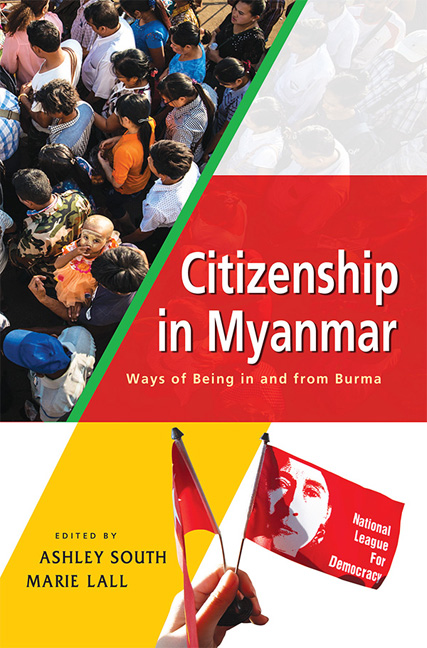Book contents
- Frontmatter
- Dedication
- Contents
- Foreword
- The Contributors
- Map of Myanmar
- Introduction
- 1 Ethnic Politics and Citizenship in History
- 2 Representation and Citizenship in the Future Integration of Ethnic Armed Actors in Myanmar/Burma
- Special Contribution: The Way Forward for Peace, Stability and Progress in Burma/Myanmar
- 3 National Political Dialogue and Practices of Citizenship in Myanmar
- 4 Citizenship and Minority Rights: The Role of “National Race Affairs” Ministers in Myanmar's 2008 Constitution
- Special Contribution: Karenni People at a Glance
- 5 Myanmar's Youth and the Question of Citizenship
- Special Contribution: I Am a Citizen of Myanmar
- 6 “The Value of Life”: Citizenship, Entitlement and Moral Legibility in Provincial Myanmar
- Special Contribution: How I Became Shan
- 7 Conflict and Mass Violence in Arakan (Rakine State): The 1942 Events and Political Identity Formation
- 8 Exploring the Issue of Citizenship in Rakhine State
- Special Contribution: Rohingya and Nationality Status in Myanmar
- 9 Myanmar's Other Muslims: The Case of the Kaman
- Special Contribution: Interview with P'doh Kweh Htoo Win
- Index
Special Contribution: Interview with P'doh Kweh Htoo Win
Published online by Cambridge University Press: 28 June 2018
- Frontmatter
- Dedication
- Contents
- Foreword
- The Contributors
- Map of Myanmar
- Introduction
- 1 Ethnic Politics and Citizenship in History
- 2 Representation and Citizenship in the Future Integration of Ethnic Armed Actors in Myanmar/Burma
- Special Contribution: The Way Forward for Peace, Stability and Progress in Burma/Myanmar
- 3 National Political Dialogue and Practices of Citizenship in Myanmar
- 4 Citizenship and Minority Rights: The Role of “National Race Affairs” Ministers in Myanmar's 2008 Constitution
- Special Contribution: Karenni People at a Glance
- 5 Myanmar's Youth and the Question of Citizenship
- Special Contribution: I Am a Citizen of Myanmar
- 6 “The Value of Life”: Citizenship, Entitlement and Moral Legibility in Provincial Myanmar
- Special Contribution: How I Became Shan
- 7 Conflict and Mass Violence in Arakan (Rakine State): The 1942 Events and Political Identity Formation
- 8 Exploring the Issue of Citizenship in Rakhine State
- Special Contribution: Rohingya and Nationality Status in Myanmar
- 9 Myanmar's Other Muslims: The Case of the Kaman
- Special Contribution: Interview with P'doh Kweh Htoo Win
- Index
Summary
1. What does citizenship mean to you?
I was born in Myanmar, and so I am a citizen of Myanmar. Even after I joined the Karen revolution, I still felt that I was a citizen of my country, Burma. After all, I hold a citizen's ID card (Citizenship Scrutiny Card).
Being a citizen is like being a member of the family, and family members don't always get along peacefully! All citizens should have rights, equal with each other. This is particularly important for Karen people, who live spread across the country, and not just in Karen State. It's important that Karen and other ethnic people have rights to self-determination in their own homeland territory and also in other parts of the country.
2. What are the problems Karen people face as citizens of Myanmar/Burma? How have Karen people been treated by the state/government in the past, and present? What are the main challenges?
In the past, during the long years of armed conflict, Karen people faced many difficulties. Issues of citizenship were particularly difficult for people living in areas under the control or influence of the KNU, and other armed groups. They often did not have a chance to receive ID cards, or be recognized as full citizens of Myanmar. The government, and particularly the Myanmar Army, thought of them as KNU supporters, and often treated very badly. It was difficult for villagers to get even basic services from the government, and they were often abused and marginalized. Even for Karen people living “inside” the country, in areas under government control, it was difficult for them to learn their language, as ethnic languages were not used in government service or in schools. Karen and other ethnic nationality people were often looked down on by members of the majority community, and there was great prejudice and widespread racism. Things have started to improve in the last few years, particularly because of the peace process — but there is still a long way to go. Many people in the government and the military are still suspicious of ethnic minority communities.
3. What is the relationship between Karen people and other citizens of the country?
(Relations with the Bama community:) I come from a Christian family in the Tanintharyi Region. Our community has suffered many long years of oppression.
- Type
- Chapter
- Information
- Citizenship in MyanmarWays of Being in and from Burma, pp. 301 - 304Publisher: ISEAS–Yusof Ishak InstitutePrint publication year: 2017



